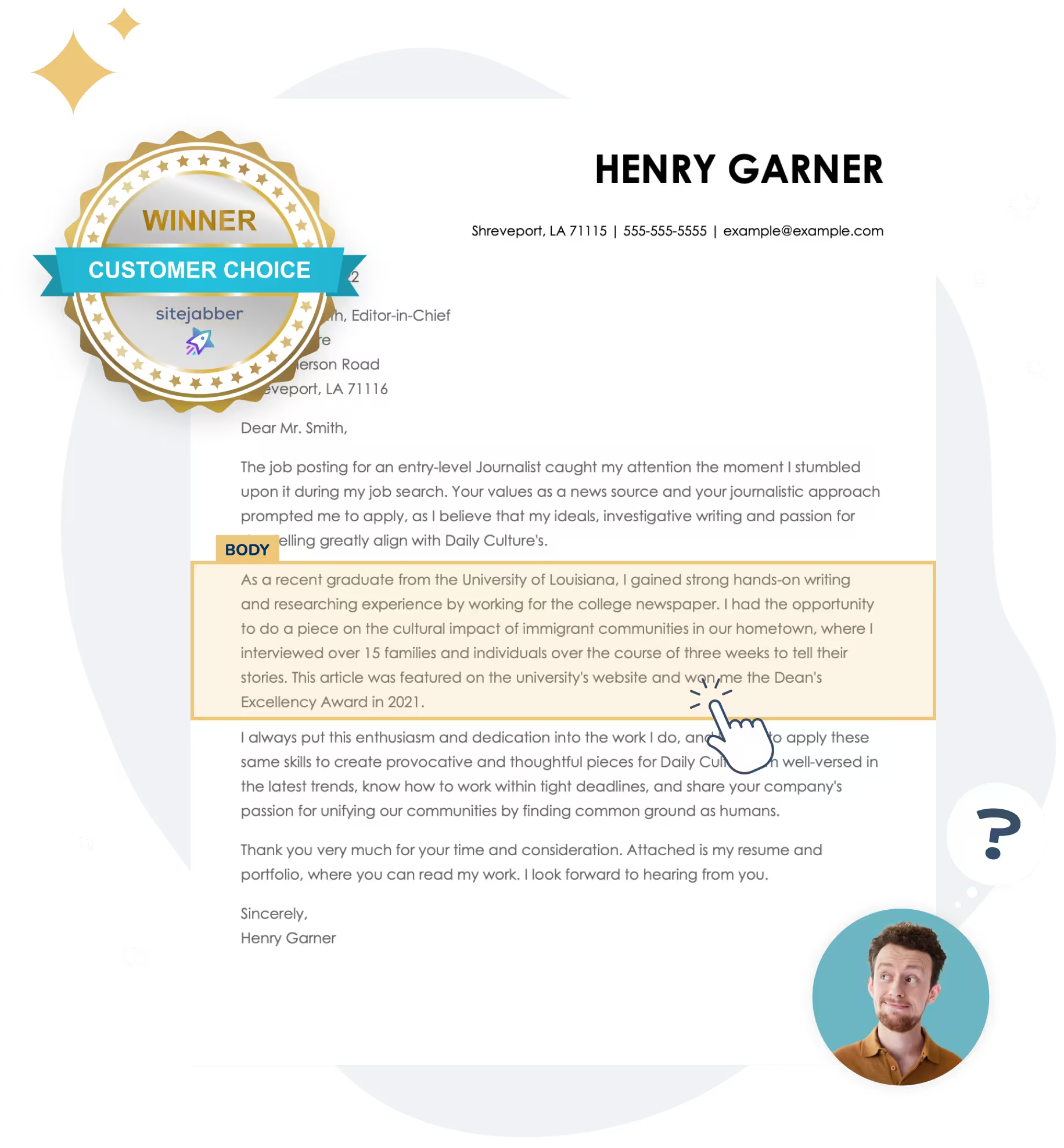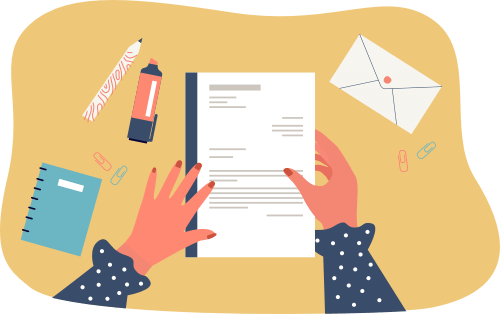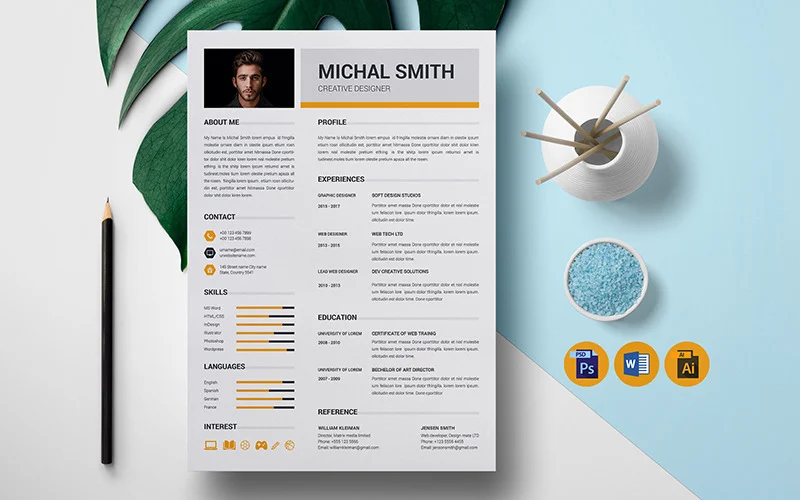How to Write a Resume (Examples & Guide)
Did you know that 40% of hiring managers spend less than a minute reviewing a resume?...
Natalia Merced, CPRW • Mar 20, 2025

Build your perfect resume with industry-specific suggestions and professionally written content.
Create Your Resume
Create your Cover Letter with tailored content ideas, or generate one based on your resume.
Create Your cover letter
Make an impressive CV that wins interviews with suggestions tailored to your career goals.
Create Your CVNeed help?
Master the art of first impressions with our comprehensive guide on the cover letter format. Unlock the secrets to crafting a cover letter that stands out and lands you your dream job.
Last Updated: May 11, 2025
40% higher chance of getting a job‡
47% higher response rate from recruiters‡
EXCELLENT


A good cover letter format helps you create a clear and concise letter to complement your resume. Following a business letter format shows your qualifications and personality in a professional way, helping you make a great first impression.

The purpose of a professional cover letter format is to clearly and concisely frame your qualifications and
who you are as a professional. Each section plays a role.
Use the standard business letter format to structure your cover letter. You can see how to structure your
letter by referencing our library of cover letter examples.
Follow this guide to learn how to format a cover letter for a job application correctly. Start with the
basics:
A proper cover letter format begins with a header that contains your current contact information.
Use the same resume header for consistency.
Your cover letter header should include the following information:
Every business letter includes the recipient’s contact information. Your cover letter should include
the hiring manager’s contact information in the following format:
Date
Hiring manager’s name
Company name
Company address
City, state, ZIP code
Place the date, followed by a paragraph space and then align the receiver’s information to the left
of your document, just under the cover letter heading. The examples below will show you how this
step looks.
The job application letter format calls for a professional and formal greeting. Use “Dear” and
address the reader by name. Avoid “Hello” or “Hi” in your cover letter salutation.
Do not use formal titles, such as “Mr.” “Miss” and “Ms.” to avoid misidentifying the person you’re
addressing. Instead, use their full name, like “Dear Charlie Jackson” or “Dear Leslie James.”
If you do not have a person to address, research the company for a match. Can’t find a name to refer
to? Then it’s acceptable to greet your reader by their title, like “Dear Professor” or “Dear
Doctor.”
You may also address a department, like “To the Hiring Manager” or “To the Human Resources
Department.” Avoid writing a generic greeting like “To Whom It May Concern.”z
Cover letter formats start with a brief but engaging opening paragraph. In three to four sentences,
grab the hiring manager’s attention by enthusiastically making an opening “pitch” in which you tell
them what you can do for them and then back it up. Convey passion for the work and confidence in
your abilities.
The format of a cover letter introduction follows a basic formula: Brief introduction, why you’re
interested in the position and why you are the best person for the job.
This cover letter formatting example shows what that looks like in practice:
I’m a marketing coordinator with five years of experience driving social media campaigns for Company B. I’ve been following Gadgets, Inc. on Instagram since the company was launched last year and was excited to see you have an opening for a social media manager. My consistent track record of conversion-winning campaigns at Company B shows that I can increase your customer base and retention by 25% in my first three months as your social media manager.
Numbers make a big impact! Quantify your achievements and goals in your cover letter format when possible.
It’s time to provide details about your skills and job experiences. A good cover letter format will
have two or three body paragraphs that connect your top job qualifications with the requirements and
responsibilities detailed in the job description.
Take a look at this cover letter format example paragraph to see what we mean:
Over the past two years, I’ve worked as a store manager, engaging with customers and handling inventory distribution for three sister stores. My experience working with transportation brokers, managing database information, and maintaining high-level service aligns with what you’re looking for in a logistics manager.
Cover letter body paragraphs are also where you can show you’ve done your homework on the
company, underscoring your interest and enthusiasm.
While you’re at it, mention specific aspects of the job and organization that attract you,
like this:
I’m impressed with your company’s dedication to improving your products while sticking to environmentally friendly production processes. I share your passion for caring for the environment. To that end, I volunteer weekly at my local chapter of Natural Resources Defense Council, Inc.
The format for cover letter body paragraphs is three to four sentences each, so make every word count. Use action verbs throughout to pack a punch!
Conclude your cover letter with a single paragraph of around three to four short sentences. These
should confidently recap why you’re the best candidate for the role.
Thank the reader for their time, reiterate genuine interest in the job, and invite the hiring
manager to follow up with you for an interview.
For example:
Thank you for considering my application. I’m certain my talent for contract negotiations, eye for design and aptitude for organization make me the event planner you’ve been looking for. I’d be honored to show you why Atlanta Magazine named me “Planner of the Year” in 2018 and 2019. Please contact me by phone or email at your earliest convenience to discuss how we can work together to achieve your event planning goals this year and beyond.
The standard cover letter format for a sign-off is a simple formal phrase followed by a comma, then
a space, and your name.
Wrap up your cover letter with phrases like “Best regards,” “Regards,” “Respectfully,” or
“Sincerely,” for your sign-off.
Don’t use informal terms like “Thanks!” Take care,” “Cheers!” or “Have a nice day!”
Ready to start writing? Our Cover Letter Generator gives you a leg up by using your resume to create a professional cover letter on a stylish template.


The best way to format a cover letter is with a professional cover letter
template that you can customize with your information.
You can use one of our professionally designed templates to create a cover letter from scratch or generate
one from the information in your resume.
Our cover letter templates organize your qualifications based on applicant
tracking system (ATS) requirements, making it easy to write a professional cover letter in minutes.

No matter the job you’re applying for, we give you the right words and relevant skills you can incorporate with just one click.

Write a cover letter for every job application and save as many versions of it as you need.

Get suggestions and advice at every step to help you present your best self and get the job.

Save and export your cover letter as a PDF, DOCX or plain text.
An email cover letter format differs slightly from a standard cover letter format. If the job description requires you to send your letter in the body of an email, then use these tips to organize your email message perfectly:
If the employer doesn’t give you specific instructions for submitting a cover letter for a job application, put the title of the position you’re interested in and your name in the subject line.
Subject Name of Job - Your Name
When you format a cover letter for an email message, you don’t need to include the employer’s mailing address. Skip straight to writing a formal greeting (e.g., “Dear Mrs. Jones”).
Dear Mr./Ms. Last Name.
A professional format for a cover letter places your contact information underneath your sign-off in this order:
Best Regards,
Your Full Name
City and state of residence
Email address
Phone number
Job profile link (if available)
Get inspiration from a cover letter sample format. We have an extensive library of cover letter layouts for most jobs, industries, career levels and circumstances, so you’re sure to find the best cover letter format for your needs.


Follow a standard cover letter format to show professionalism. The magic is in the details: the margins, fonts and spacing. Follow these cover letter tips to ensure your cover letter looks great!
Our samples show you how to format a cover letter so the side, top and bottom margins are one inch all the way around.
A proper cover letter format uses standard fonts such as Times New Roman, Helvetica or Arial, in 12-point size. Unusual fonts can confuse applicant tracking systems (ATS) that employers use to scan cover letters and resumes.
As our cover letter examples demonstrate, your cover letter layout should be single-spaced, with a double space between paragraphs.
Your text should be left-justified throughout your cover letter. The one exception to this might be your cover letter header, depending on the template you’re using.
Unless the employer specifies a preferred format, it’s advisable to save and send your cover letter as either a PDF or Word document. Use your name to save the cover letter; for example: “Your Name” or “YourName_Cover Letter.”
Save your letter in our Cover Letter Generator in both formats and plain text.
Here’s a quick recap so you can write the perfect cover letter and get an interview.
A cover letter format follows a straightforward business letter format.
Use 1-inch margins with a common font like Helvetica in 12-point size for maximum legibility.
Align the date and hiring manager’s address at the top left under the cover letter heading.
Start with an attention-grabbing opening paragraph that shows interest in the position and confidence that you are the best fit.
There are two or three body paragraphs in a cover letter format. Use them to elaborate on why you’re interested in the job and the skills you can bring.
Emphasize professional achievements and use numbers to make an impact.
Don’t be afraid to invite the hiring manager to contact you for an interview in your cover letter closing.
Your letter should be one page and 500 words long.
A cover letter template makes creating a professional cover letter easy. Use one with our Cover Letter Builder, and we will format a cover letter for you.
FAQ
Our career center has plenty of additional tips and guides to help you get the best cover letter format.

Did you know that 40% of hiring managers spend less than a minute reviewing a resume?...
Natalia Merced, CPRW • Mar 20, 2025

Did you know that 40% of hiring managers spend less than a minute reviewing a resume?...
Natalia Merced, CPRW • Mar 20, 2025

Did you know that 40% of hiring managers spend less than a minute reviewing a resume?...
Natalia Merced, CPRW • Mar 20, 2025